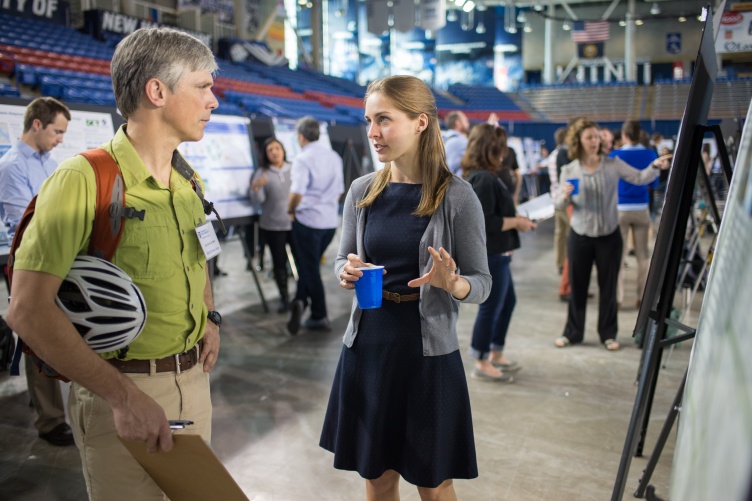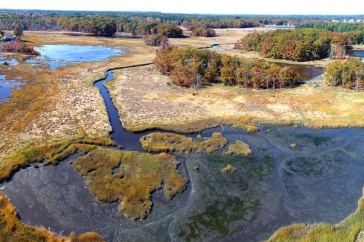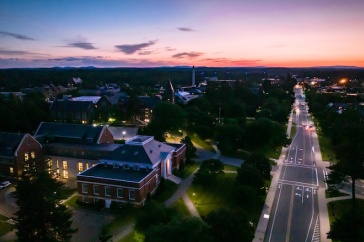
This is what the GRC has looked like in years past. This year, the conference has gone virtual.
The UNH Graduate Research Conference (GRC) has grown steadily every year since its inception in 2002. What began as a modest showcase of graduate research has become a week-long interdisciplinary celebration, spanning across all different platforms, including posters, oral presentations, and the 3-Minute Thesis competition. The UNH graduate community has come to know this spring event series as Graduate Student Appreciation Week, and the GRC is at the heart of this tradition.
This year, due to the UNH campus closure, the Graduate School made the decision to take the research conference online. The general format was the same, just digitized: students could present work as a digital poster or a narrated video presentation. Rather than the conference happening in two finite days, the presentations went live on April 20, 2020, and they have remained available for viewing.
In total, 178 graduate students participated, and the web platform reached over 4,000 hits in the first week.
Jovana Milosavljevic-Ardeljan, one of the graduate assistant organizers as well as GRC participant from the education department, said that much of this event’s success is owed to Michael Routhier, Information Technologist Manager in the UNH Earth Systems Science Center. Routhier created the online platform as well as helped manage it throughout the event.
“With the GRC being online this year, the entire conference became more accessible than ever,” said Caroline Kanaskie, a PhD student in the natural resources department.
However, Kanaskie was clear—the accessibility of sharing research online also came with the challenge of clear communication. “Since I can’t be there standing next to my poster every time someone clicks on it, I wanted to make sure my poster was as streamlined and clear as possible,” Kanaskie said. She shared her poster with friends and family via Facebook and received 194 views in the first week.
Whether the participants were familiar with presenting their research, or presenting for the first time, most agreed that the virtual GRC offered learning opportunities for everyone at any stage.
“I have never presented a poster presentation prior to the GRC,” said Mackenzie Kalp, a masters student in forestry whose poster received 120 views in the first week. For Kalp, the digital poster templates provided by the Graduate School created a great learning experience for clearly expressing her work, which she imagines will serve her in conferences to come.
For Simone Chapman, a masters student in environmental conservation, the online GRC was just as challenging as presenting in-person. “For in-person presentations, the main challenge is having a number of people staring at you, but for online presentations, I had problems with stuttering, distractions and having to listen to my voice over and over again,” Chapman said. Like Kanaskie, Chapman broadcasted her oral presentation on Twitter and LinkedIn, and received 98 views in the first week.
As is tradition, two graduate student participants received a Leitzel Center Award, which recognizes exemplary STEM education and outreach presented at the GRC. The oral presentation winner was David Fifty, a PhD student in mathematics education, and the poster presentation winner was Natallia Diessner, a PhD student in the natural resources department.
Though taking the GRC online was not an anticipated reality of this year, many participants have spoken to the value of learning how to share work online.
“We are forced now to find ways to do our work remotely, and that means digitally,” Milosavljevic-Ardeljan said. “And in the case of sharing research digitally, it really takes more than just being tech-savvy. It’s like learning a new language—you need to get your message across through a computer screen, which requires a new way of thinking.”
You can view all GRC presentations in this media gallery, as well as those highlighted in this story below:
- "Community matters: a tree-killing bark beetle does not escape its natural enemies as its range expands" by Caroline Kanaskie (PhD NRESS Student) and Professor Jeff Garnas
- "Does Money Really Grow on Trees? The Economics & Ecology of Timber Stand Improvement" by Mackenzie Kalp (MS NREN: Forestry Student) and Professor Theodore Howard
- “Who Wins and Loses from ‘No Net Loss’?” by Simone Chapman (MS NREN: Environmental Conservation Student) and Professor Catherine Ashcraft
- “Strengthening Community and Communication: The Multiple Roles of Communication Support Programs” by Jovana Milosavljevic Ardeljan (PhD Candidate in Education: Leadership & Policy)
- “Improving Post-Secondary Stem Retention: A Focus On Developmental Mathematics” by David Fifty (PhD Candidate in Mathematics Education)
- “Playing The “Dam” Game: Evaluating The Suitability Of Science-Based Role-Play Simulations As Tools For Learning About Sustainable Water Futures” by Natallia Diessner (PhD NRESS Student) and Professors Catherine Ashcraft, Weiwei Mo, Cuihong Song, Lawrence Hamilton, Shannon Rogers, and Kevin Gardner
-
Written By:
Lily Greenberg '21G | Grad School
















































